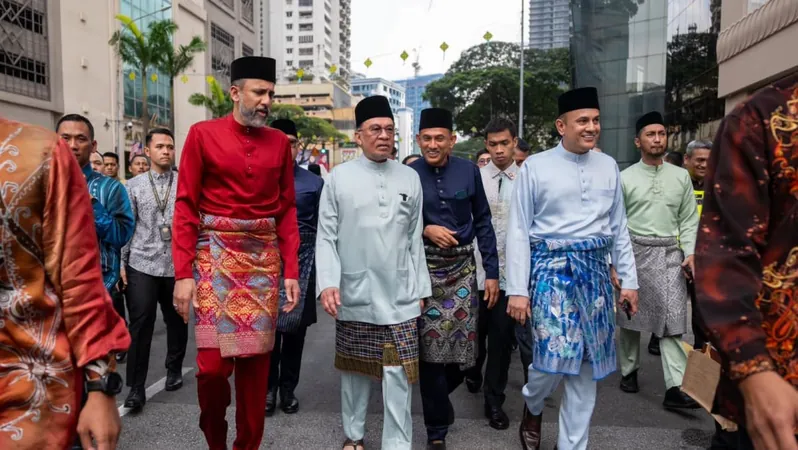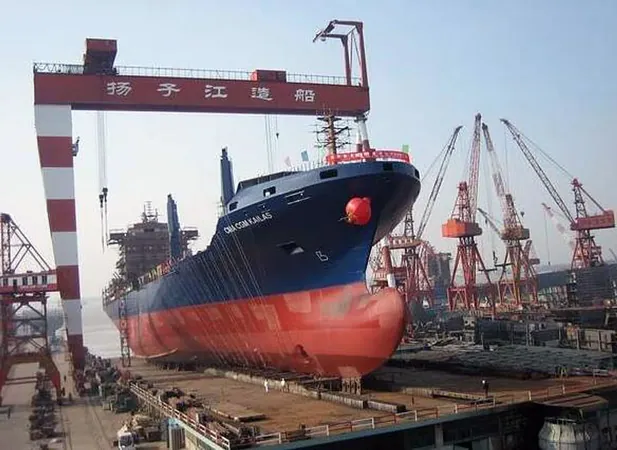
Malaysia's PM Anwar Celebrates New Mosque Amid Controversy Over Hindu Temple Relocation
2025-03-27
Author: Li
KUALA LUMPUR: In a significant development on March 27, Prime Minister Anwar Ibrahim proudly announced the upcoming construction of the Madani Mosque in Kuala Lumpur, calling it a “victory” after a decade of planning delays.
This announcement comes amidst a contentious debate regarding the relocation of the 130-year-old Dewi Sri Pathrakaliamman temple, which currently occupies a portion of the land designated for the mosque.
In a bid to accommodate the new mosque, the temple will be moved approximately 50 meters to a new site that will be officially gazetted for religious purposes.
This decision has ignited a backlash from various Hindu advocacy groups and segments of the Malay-Muslim community, who argue that the temple’s existence is illegal due to alleged absence of proper land deeds.
At the groundbreaking ceremony for the Madani Mosque, Anwar highlighted the importance of addressing sensitive issues with wisdom and compassion.
“We need to showcase the strength of Islam in a non-arrogant manner,” he asserted, emphasizing that societal harmony is a core value of his administration’s “Madani” or Civil Malaysia initiative.
Despite the tensions surrounding the mosque’s construction, there is acknowledgment of a recent agreement reached between the parties involved.
Following the ceremony, Anwar met with members of the temple committee, expressing optimism that the situation had been amicably resolved.
K Barthiban, the temple committee chairman, shared that they appreciated the government’s approach to fostering communal unity.
A heavy police presence marked the groundbreaking event at Jalan Masjid India, reflecting the sensitivity of the occasion.
Anwar had previously called for cooperation, urging all parties not to politicize the temple’s relocation amidst his push to expand religious facilities to serve the growing Muslim population in the area.
“Mosques are overcrowded, and more prayer spaces are needed,” he noted.
A Long-Standing Dispute
The Jalan Masjid India area has historical significance for the Indian Muslim community.
The Dewi Sri Pathrakaliamman temple, reportedly erected without legal authorization, was built on land that had previously been government property before its sale in 2014 to Jakel Trading Sdn Bhd, a textile conglomerate.
The company had intentions to utilize the land for a mosque aligning with the aspirations of its late founder.
Zaliha Mustafa, the Federal Territories Minister, confirmed that the temple will be relocated to a new 4,000 square-foot site — equal in size to its current footprint.
However, debates have arisen regarding the legality and ethics surrounding the temple's original claim to the land and whether the temple should have been relocated at all.
Many community members argue that preserving the temple alongside the new mosque would symbolize Malaysia's commitment to coexistence and religious diversity.
Meanwhile, the Malaysia Hindu Sangam (MHS), representing the Hindu population of the country, criticized the temple’s relocation plan and demanded a review of policies affecting temples that have operated for generations, often without formal recognition or clear land ownership.
They argue that many temples previously sanctioned during British colonial times now find themselves in precarious legal situations due to urban development and shifting legal frameworks.
Figures such as Penang’s former deputy chief minister have called the relocation “unacceptable,” stressing the necessity of preserving important cultural heritage sites.
Critics of the decision maintain that the government must act responsibly in balancing developmental concerns with the rights and heritage of minority communities.
What Lies Ahead?
With strong sentiments from both sides, this incident showcases the ongoing challenges in navigating Malaysia's multicultural landscape.
The Madani Mosque represents not just a religious edifice but also a pivotal point in the ongoing discourse on religious rights, communal harmony, and urban development.
As tensions linger, the broader implications of this situation will undoubtedly continue to resonate across Malaysia's diverse communities.
Stay tuned for further updates on this developing story — is this the beginning of a new chapter in Malaysia's religious coexistence, or is it a deepening divide in its multicultural society?




 Brasil (PT)
Brasil (PT)
 Canada (EN)
Canada (EN)
 Chile (ES)
Chile (ES)
 Česko (CS)
Česko (CS)
 대한민국 (KO)
대한민국 (KO)
 España (ES)
España (ES)
 France (FR)
France (FR)
 Hong Kong (EN)
Hong Kong (EN)
 Italia (IT)
Italia (IT)
 日本 (JA)
日本 (JA)
 Magyarország (HU)
Magyarország (HU)
 Norge (NO)
Norge (NO)
 Polska (PL)
Polska (PL)
 Schweiz (DE)
Schweiz (DE)
 Singapore (EN)
Singapore (EN)
 Sverige (SV)
Sverige (SV)
 Suomi (FI)
Suomi (FI)
 Türkiye (TR)
Türkiye (TR)
 الإمارات العربية المتحدة (AR)
الإمارات العربية المتحدة (AR)